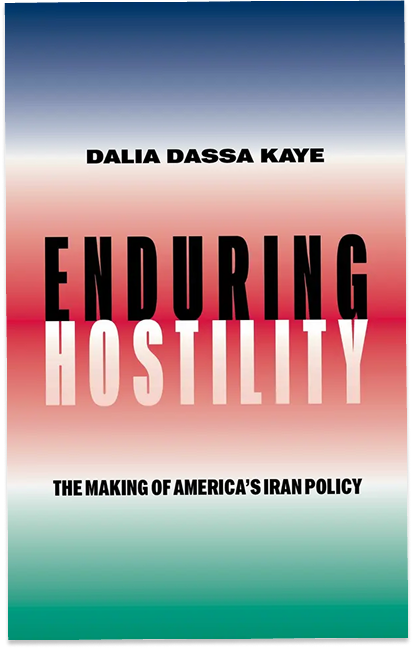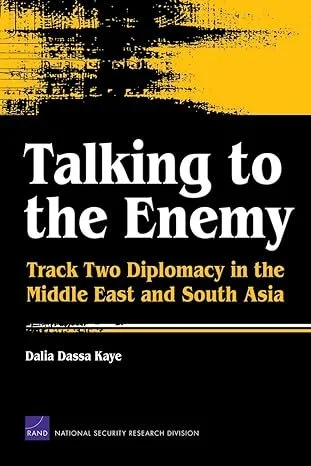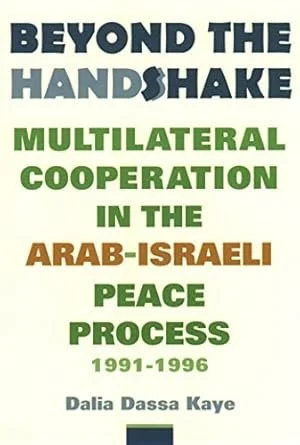Books by Dalia Dassa Kaye
Available December 2025
Enduring Hostility
The Making of America’s Iran Policy
A timely and rigorous analysis of a half-century of American policymakers' shifting perceptions of Iran, and how they have driven US-Iran relations.
-
US–Iran hostility has endured for longer than the Cold War. Momentous geopolitical shifts, changing leaderships, and evolving domestic priorities have not fundamentally altered this antagonistic relationship. Standard explanations pin the blame for this enduring hostility on Iran and its leaders' revolutionary ideology and policies at odds with the United States and the West. While Iran bears significant blame for a deeply adversarial relationship—the country often engages in dangerous and repressive activities—this book demonstrates that "it's them, not us" accounts cannot alone explain America's posture toward this complicated but critically important country. Drawing on original interviews with former government officials, oral histories, memoirs, congressional hearings, archival material, and the author's own participation in dozens of Iran-related track two meetings, Dalia Dassa Kaye deftly explores how America's Iran policy is made, the people who make it, and the underlying ideas and perceptions that inform it. Dassa Kaye looks back at US policy toward Iran over the past four decades to help us look ahead, offering wider lessons for understanding American foreign policymaking and providing critical insights at a pivotal time of heightened military tensions in and around the Middle East.
-
236 Pages
Publisher: Stanford University Press
Hardcover ISBN: 9781503643901
Paperback ISBN: 9781503644595
Pre-Order on:
Praise for Enduring Hostility
"In this incisive and timely book, Dalia Dassa Kaye tells the story of over four decades of America's effort to contend with Iran's regional role and nuclear ambitions. A much-needed resource on an urgent topic and a must-read for policymakers and academics."
—Vali Nasr, author of Iran's Grand Strategy: A Political History
"Enduring Hostility fills an important gap in our understanding of the troubled relationship between Iran and the United States. Digging deep into history, and drawing on new evidence, Dalia Dassa Kaye finds that American policy towards Iran is, at its core, 'homegrown.' A thoughtful, readable, and important analysis for anyone interested in the contemporary Middle East."
—Janice Gross Stein, University of Toronto
"Dalia Dassa Kaye's highly readable account of US–Iran relations since the Iranian Revolution considers why successive American administrations have only made half-hearted efforts to transform that relationship: in part because the default position—Iran is an implacable foe—reflects the perceptions and interests of many US players. A must-read for Middle East watchers."
—Ellen Laipson, George Mason University
Previous Books
Talking to the Enemy
Track Two Diplomacy in the Middle East and South Asia
-
This monograph examines regional, multilateral track two dialogues in the Middle East and South Asia that are focused on arms control and other cooperative security measures. Unofficial policy discourse, or track two diplomacy, is an increasingly important part of the changing international security landscape, with the potential to raise new ideas and solutions to conflicts that, over time, may influence official policy. Talking to the Enemy considers how track two efforts in South Asia and the Middle East have socialized participants into thinking about security in more cooperative terms, and whether the ideas generated in track two forums have been acknowledged at the societal level or influenced official policy. Comparing the two regions, Kaye finds that South Asian dialogues, on Kashmir and other regional issues, have been more somewhat more effective than track two efforts in the Middle East, where lack of progress on official Arab-Israeli peace talks has also hindered unofficial regional dialogues. The author concludes with assessments of regional security trajectories in both regions, particularly proliferation dynamics, as well as suggestions on how to improve future track two efforts.
-
164 pages
Publisher: RAND Corporation
Publication date: September 9, 2007ISBN: 978-0833041913
Beyond the Handshake
Multilateral Cooperation in the Arab-Israeli Peace Process
-
Arabs and Israelis have battled one another in political and military arenas, seemingly continuously, for some fifty years. The 1991 Madrid Peace Conference sought to change this pattern, launching bilateral and multilateral tracks in the Arab-Israeli peace process. As a result, a broad group of Arab states sat down with Israel and began to cooperate on a wide range of regional issues in what became known as the Middle East multilaterals. Yet why did enemies reluctant even to recognize one another choose to cooperate on regional problems? And once this process began, what drove the parties to continue such cooperation or, in some cases, halt their cooperative efforts? Beyond the Handshake addresses these fundamental questions, exploring the origins of the multilaterals and the development of multilateral cooperation in the areas of arms control and regional security, economic development, water management, and the environment. Dalia Dassa Kaye, challenging conventional concepts of cooperation, argues that multilateral cooperation in the Middle East must be appreciated as a process of interaction rather than solely as a set of outcomes. Presenting theoretical insights of value to students of regional and international relations, Beyond the Handshake provides a unique look at the evolving nature of Arab-Israeli relations and exposes the foundation the multilateral peace process laid for future regional cooperation in the Middle East.
-
256 pages
Publisher: Columbia University Press
Publication date: September 9, 2007ISBN: 978-0231120029


